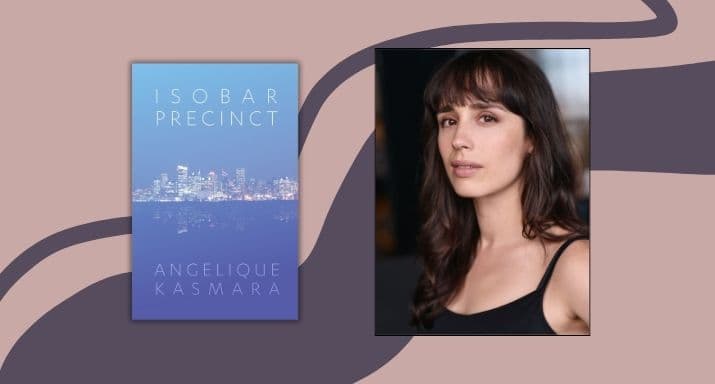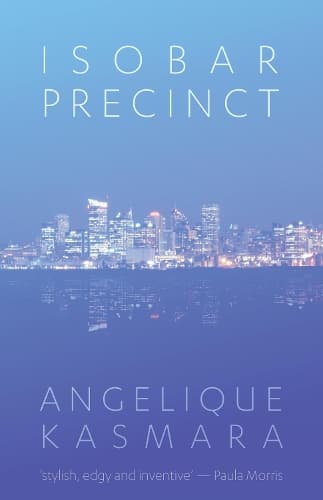"You can lose yourself in the telling"

My best childhood memories are from being read to. It’s a comfort that has stuck, even if bedtime stories have long been swapped for listening to poetry pitched across the din of a bar or a novel piping through the speakers on a road trip. So of course, I was absolutely delighted when Melbourne-based Bolinda Publishing decided to produce an audio version of my first novel, Isobar Precinct.*
The process started with a request from the publisher to provide them with an audio clip of key words and phrases from the book, an assignment that confirmed for me that my own narration skills are rather lacking. I also filled in a form that was essentially a wishlist of narrative qualities important to the author, such as age range and accent. Bolinda auditioned actors and sent me a shortlist: Eva Seymour’s compelling voice was an immediate standout.
Eva was kind enough to let me interview her on the craft of audiobook narration.
First of all, thank you for your stellar job in narrating my book! You tackle the central narrator and other characters in such a wholehearted way, and your rhythm and tone is spot on. How many books have you narrated altogether?
Thank you for the lovely feedback! It was a joy to narrate. The job is made easier when the characters are so vivid and interesting. So far I’ve narrated 13 audiobooks, some of which weren’t full cover-to-cover narration, but instead narration of a specific character, with other chapters narrated by other people.
How did you become an audiobook narrator?
I’m an actor by trade, so I do a variety of roles in film, television and theatre, but as we all know acting work is not reliably bountiful! So through my agent I have done a lot of voiceover work for some years now, which I’ve always really enjoyed. It’s mostly commercial voiceover work, either for radio or screen content, or English dubbing for international content on Netflix (a more recent gig I’ve been doing which is very fun.) My first audiobook narration was for The White Wash by Siang Lu, a very entertaining novel which features multiple first person narration, so I voiced one character and was only really in the booth for an hour or so. It was lots of fun but I didn’t get the opportunity to narrate my first cover-to-cover novel for another couple of years. When I did finally perform my first complete audiobook, I was absolutely floored by how long it took. The number of hours involved made it really challenging, and I decided it might not be for me. Of course, I booked another audiobook job very quickly after that, and discovered that I might be rather good at it, so I’d better learn to enjoy it! Once I’d a couple under my belt I found my rhythm, and now I get a kick out of narrating them.
What makes a good audiobook narrator?
I still feel that I’m very much at the beginning of my narration career, so I’m not an expert, but I’ve learned that slowing down is very useful. I have a habit of reading quite quickly, but it can set you up for lots of fumbles, and make the story difficult to follow for a listener. When I listen to great audiobook narrators, they’re really steadily paced, and allow the story to unfold in a way that sparks a listener’s imagination.
Narrating books is an absolute marathon. How do you prepare?
I read the book at least once and take notes. I jot down what accents I might need to whip out, place names I’m unsure of, and write a list of all the characters with little cues for myself on how I want them to sound. Because a book can take several days to record, and some characters might have big gaps in between appearances, I find noting the voices I’ve created for them very important, lest I forget midway through.
What do you like about this kind of work?
It’s really gratifying when you get a really exciting story, and can lose yourself in the telling. I’ve recorded some fabulous narratives and voiced some very funny characters. I also love being able to voice nonfiction works too, because I learn so much and feel obliged to do a service to the real life account. It’s so different every time, as every novel is completely different from the next. Ultimately it’s a privilege to play a role in the storytelling that someone has invested so much of their life into. Novelists are so impressive, and I feel a duty to do their work justice.
Are there aspects of narration that you find particularly difficult, whether it's to do with subject matter, character accents, language?
Some accents feel completely out of my grasp, so I don’t even attempt them! It can be tricky when there’s lots of content-specific jargon (in nonfiction books) where I do my best to sound like I know what I’m talking about, whilst hoping I’m not messing it up. Sometimes you also have pages with long run-on sentences that trip you up. Reading aloud is very different from reading internally, and sometimes you’ll get books which are easier done with the latter…!
Which Aotearoa New Zealand books have you narrated?
Other than Isobar Precinct, I’ve narrated two others - She’s a Killer by Kristen McDougall and Bird Life by Anna Smaill. I was also one of three narrators for JP Pomare’s latest novel, 17 Years Later: the character I read is Australian, but the novel is set in New Zealand. Got to whip out the Kiwi accent a wee bit for that one too!
Are you pretty good at doing a Kiwi accent or are there other factors involved in why you’ve been selected to do books from Aotearoa?
I was born in Takapuna and spent a lot of time in New Zealand as a child and teen. My mum's Kiwi, and all her family live there. I grew up in Australia but we went back to New Zealand as often as we could, so I think that kept the accent alive.
Do you have any favourite narrators? Do you like listening to audiobooks yourself?
I don’t have any favourite narrators personally, but I do love listening to nonfiction audiobooks. I love reading fiction the old analogue way, but for some reason don’t have the attention span for reading nonfiction… audiobooks make the task so much easier. I absorb the information so much better aurally.
Aotearoa New Zealand fiction makes up just 5 percent of total book sales here. Compare that figure with Australia - Australian fiction makes up about 30 percent of total sales (based on Nielsen BookData stats). Do you have any insight on why Australians have embraced Australian writers and their books?
That’s an interesting statistic! I had no idea. Growing up I always read Aussie novelists, and I felt I could identify with the characters. Our school reading lists were always Australian authors, and libraries always promoted the latest Aussie Young Adult fiction. It’s funny, all the books my friends would recommend were always Australian authors too, so I suppose culturally it’s been the norm, but I’ve never really questioned why. Supporting local authors is important, and that was really instilled in me by my family and in the education system.
Eva Seymour is an award-winning actor, voice artist and published songwriter based in Melbourne. After completing her training at 16th St Actors Studio and the Royal Academy of Dramatic Art London, she has worked for theatre companies across Australia and the UK, including Malthouse, Melbourne Theatre Company and Red Stitch Actors Theatre. She has also appeared in television shows and films.
Angelique Kasmara is a writer, reviewer, editor and the author of award-winning novel Isobar Precinct (The Cuba Press, 2021).
Bolinda’s audiobook of Isobar Precinct, narrated by Eva Seymour, is available here.
* Author’s note: Isobar Precinct has also been recorded for Blind Low Vision NZ, narrated by Marguerite Vanderkolk. This version is available for members of Blind Low Vision.
